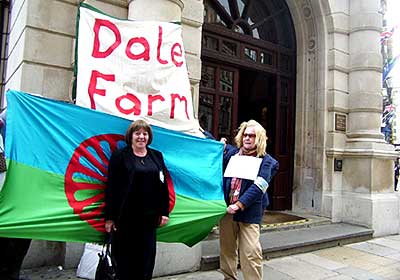|
from september 17 2006 blue vol V, #12 |
|

Kathleen McCarthy at the pregnant mothers' vigil in London on May 18 by Grattan Puxon
Every month it seems the stakes are raised in what was never meant to be but has inevitably become a test-case of British attitudes and actions, not only towards Irish Travellers, but the related life styles of 350,000 Gypsies and newly-arrived Roma. "Ethnic-cleansing is not a term I'd had much use for up to now," says Richard Sheridan, leading spokesman for the thousand Travellers whose homes are threatened. "It's a phrase the council don't like us repeating." Basildon council, by a slim majority, has voted to spend €5m to remove what it calls 120 un-authorised caravans from the district. These include 86 chalets, mobile-homes and trailers standing on land purchased by members of the Sheridan clan at Oak Lane, Crays Hills, Essex. These homes comprise roughly half the Dale Farm settlement, virtually a village built on an old scrap-yard and the site of war-time buildings and air-raid shelters. Previous Labour administrations in what used to be known as Basildon New Town, gave their approval for more than 40 Travellers' yards along Oak Lane, which runs through part of the greenbelt close to the arterial Southend Road. These plots have been in occupation since the l960s. It was only when Travellers began to expand the settlement by converting the council-licensed scrap-yard that the conflict started. Newly in power, Conservative councillors refused to grant any retrospective planning consent. "This place was piled high with old car-bodies," John Sheridan, who owns a plot on the scrap-yard site, says with some annoyance. "We cleaned the whole lot out and made a decent home here." Like the majority of the Travellers at Dale Farm, his people come from County Limerick. Though the most were born in England, they regard Rathkeale as their hometown, and have many relatives there. As new and second-hand furniture dealers, the Sheridans, like other Irish Travellers, used to move about widely in England, Scotland and Wales. But since enforcement of the anti-Traveller clauses in the l994 Criminal Justice Act, their way of life has been ever more tightly curtailed. That's not to say they don't travel anymore. Far from it. A new version of the travelling life is rapidly evolving, facilitated by the freedom of movement within the European Union. Using Dale Farm as a base, they"re now making extended trips to France, Germany and Spain. Some have gone has far as Sweden and Poland, even Iceland, looking for new markets. "Maybe some of us will settle over there," says Richard. "We'll be buying places in Spain next off." Pulling in on the same camping places as Sinti and Manouches, German and French travelling Gyspies, they are beginning to make new contacts in Europe. Richard believes that links with the continent are also bringing them some potential political clout. A growing band of activists like himself are looking to the new European Roma and Travellers Forum (ERTF) in Strasbourg as a focal point for their civil rights campaign. A consultative body with the Council of Europe, it has drawn together elected representatives from 40 countries and is presently flexing its influence as a parliament of 12 million Roma, who feel themselves to be largely excluded and frequently oppressed. Richard Sheridan says ERTF, on whose British board he serves, is giving the Travellers' cause an international dimension never fully realised in the past. "We know the late Tommy Doherty, may his soul rest in peace, went to Strasbourg back in l968. But it's taken the best part of forty years to get the real thing." The growth of this activism can be traced back to such events as the Travellers' convention in Ballinasloe in l965, the campaign of Nan Joyce and the birth the following year of the Gypsy Council in England, in which many Irish Travellers participated. Best remembered is that gathering of Travellers from all over Ireland in a muddy field on the outskirts of Dublin, which became known as Cherry Orchard. On those 26 acres of land opposite the Cherry Orchard Fever Hospital, in Ballyfermot, some 400 Travellers made a now legendary stand, resisting eviction for four years. The late Larry Ward of Loughrea, known through his boxing exploits as the King of the Tinkers, was there; as was Longford-born Travellers' spokesman Joe Donohue and his much-esteemed brother Pat. Those of the older generation have almost all passed away, but not a few of their grandchildren can be found today at Dale Farm. "That old Mick O'Brien who was at Cherry Orchard would be my great uncle on my mother's side," Richard explains. "The stand they made at Cherry Orchard has already gone down in history and I believe what we're achieving at Dale Farm will too - if we're fortunate enough to win." Of course, since the barrel-top wagons pulled into Cherry Orchard - and this writer's was among the first - the Travelling way of life has improved almost out of recognition. Less than half of Traveller families owned a wagon in the early 1960s. Many at Cherry Orchard had only bender-tents the first winter. Huts started to replace benders as the population rose and the Travellers began to enjoy a sense of security in numbers. "I'm told Cherry Orchard was never evicted," says Dan Flynn, another Dale Farm resident whose grand-father took part in the Dublin stand. "They bought up hundreds of guards at one point but not one of them entered the camp. It was a stand off much as we have here." It led to the setting up of Labre Park, the first caravan site in Ireland provided by a local authority. Meanwhile, the resistance to evictions by the Gypsy Council in Britain led to the passage of the l968 Caravan Sites Act. An obligation was placed on local councils to provide caravan sites; eventually some 400 were built. That sounds quite a lot. But it was not nearly enough. Tens of thousands of Travellers still had no legal place to stop. And the crisis has since worsened because the l994 Criminal Justice Act took away the site provision duty and increased powers of eviction. Many Travellers, better off than the previous generation, started to purchase land. As Richard Sheridan stresses, anyone with a bit of money would want to have their own place rather than live on a council controlled site. Self-provision has become the preferred option and now accounts for about one-third of the caravan plots in use around the country.

"I've seen a [British] government circular that advises Travellers to buy land," Richard comments. "What they didn't tell us was how to get it passed. Planning permission is just about always refused." Surveys show that a thousand families are on land without planning consent; another 3,000 are moving between short stays on car-parks and lay-bys. They continue to be harassed daily by police and officials. Enforcement against Travellers, including the blocking of potential stopping places, legal costs and full-scale move-on operations, is estimated to be running at €50 million year. The worst aspect of the anti-Traveller war is the wholesale destruction of so-called unauthorised settlements. This summer, eight unauthorised yards at Gipsy Hill, near Dale Farm, have been bulldozed and their occupants put out on the road. The remaining plots are presently under the protection of the high court, following a judicial review which went in the Travellers' favour. It's the opportunistic aspect of Basildon's guerrilla campaign which worries Kathleen McCarthy, a governor at Crays Hill primary school. "They have already damaged one yard which was supposed to have a judge's protection. So we don't know when they might try to come in here." Many families now at Dale Farm have been through the eviction mill. On January 6 last year, a hundred police and bailiffs descended without warning on Twin Oaks Farm, near Elstree film studious in Hertfordshire. "I was knocked to the ground and handcuffed," recalls Michael Slattery. "For what? Complaining because the children were cold and hungry." During this eviction, bailiffs broke in the roof of a mobile-home while elderly Ann Egan sat terrified in her wheel chair. She was due to go into hospital that day - and Hertsmere council knew it. A chalet belonging to Patrick Egan was burned with all his belongings inside. Much of the eviction work has been contracted out by local authorities to Constant & Co. of Bedford, a company that specialises in evicting Travellers. Back in 2002 this firm was sent in to clear fifty families from a place called Woodside, near Sandy. It had been purchased by Cliff Codona, now a UK delegate of ERTF. While many left before the eviction, those that stayed barricaded the entrance and refused to move. Unusually, police officers stopped bailiffs using further force after a child got under a trailer. "Looking back," says Cliff Codona, evicted himself a year later. "This was an example of good practice on the part of Beds police. I only wish other forces would do the same. Mostly we see them backing up the bailiffs." A similar confrontation took place at Bulkington Fields, near Coventry. Here a hundred Travellers saw off Constant bailiffs, and gained a brief respite. Believing, they could also save their homes through a last ditch defence, plot-owners at Meadowlands Caravan Park, in Chelmsford hired a JCB and dug deep trenches around the land. Eighty riot police accompanied the Constant men at this eviction, bringing bolt-cutters to deal with men and women who chained themselves to draw-bars. Before it was over, four caravans including a mobile-home had been burned. Travellers and bailiffs were injured and a number of Travellers were arrested. As at Woodside and Twin Oaks Farm, the land was torn up, top-soil destroyed and high earth banks erected to prevent re-entry by the owners. When some came back to look, they found pigs' slurry had been pumped onto their property. Chelmsford council is still attempting to collect €30,000 from each to cover the cost of their own eviction. While awaiting the outcome of their stand at Dale Farm, seven pregnant mothers have addressed a letter to new Local Government Minister Ruth Kelly asking her to intervene. "We're terrified a small child will be killed if they bring bulldozers in here," says Nora Egan, who has just given birth to a baby girl. Meanwhile, John Prescott, still hanging on as Deputy Prime Minister at the time of writing, has proposed an alternative on land owned by English Partnership, a government quango, at Pitsea, on the other side of Basildon. "Some of us would go to Pitsea," says the elderly John Sheridan. "Anyways it would be better than getting put out of here and thrown on the road." John's plot, which contains his mobile-home and a touring trailer, was once part of the scrap-yard. A Dutch barn stood on the site when he bought it. "I could have got planning consent to convert that barn but I pulled it down," he says with some chagrin. "I didn't understand the rules then." Like most of the 52-yard owners on the illegal part of Dale Farm, John has made several planning applications and is waiting for the appeal hearings due in August. Scores of enforcement notices have been issued and ignored. Several deadlines for leaving have passed, the last in May 2005. Needless to say, both Tory head Malcolm Buckley and local Conservative MP John Baron oppose the Pitsea proposal. Baron has collected 3,000 names on a petition against it while Buckley says he'll carry out the eviction at Dale Farm as soon as this is legally permissible. The Sheridans are pinning their hopes the planning appeals. It's thought possible Ruth Kelly will grant them consent to remain where they are for another two years, while the Pitsea option is pursued. Travellers have also won the right to a judicial review of Basildon's eviction plans, but this will not be heard before October. They have the support of the Commission for Racial Equality, whose chairman Trevor Phillips has recently issued a 200-page report on the situation of Gypsies and Travellers. He says they are the most discriminated against group in the UK. The Labour Party group in Basildon, which like the Liberals, opposes the use of force against Dale Farm, says the decision is racially tainted. Parish priest John Glynn goes further, calling what the Tories want to do an act of ethnic-cleaning. Father John has pledged to be up there with the protestors if the bailiffs are sent in. Local prejudice against the Travellers runs deep. Especially since a visit by then Tory leader Michael Howard before the 2005 general election. He stood on Oak Lane for a photo opportunity and promised that the Conservatives would take the strongest measures against all such "illegal encampments". The British National Party chalked up more than 700 votes in the May local elections, half of them cast for a candidate in Crays Hill who played up the Traveller issue. But support for Dale Farm is also gaining ground both locally and nationally. When Constant were sent to tear up yards at Gipsy Hill and Hovefields Drive, two local women were arrested for obstructing the bailiffs. Now they have formed a support group, ready should Constant be deployed against the much larger Oak Lane community. Jewish, Pakistani and anti-racist groups are also on a red alert list. The Sheridans say they can count too on celebrity backing. Star actress Vanessa Redgrave and her actor brother Corin have called for a human shield to be formed around the homes. Such an appeal could bring several hundred people to Dale Farm to help oppose an eviction operation that could take a week and might well end in a riot. The single approach along a private road is protected by scaffolding towers, surrounded by barbed-wire, and there is a series of steel gates. It would be by far the biggest "clearance" attempted by Constant, who will be up against scores of families determined not to let the bailiffs demolish their homes. "We hope this won't come to a battle," says Kathleen McCarthy, "I believe we now have the law on our side and our human rights will be recognised. If it comes to it though we won't give up without a fight. What else can we do?" 
|
| island is looking for material. Send to Newsdesk. |



